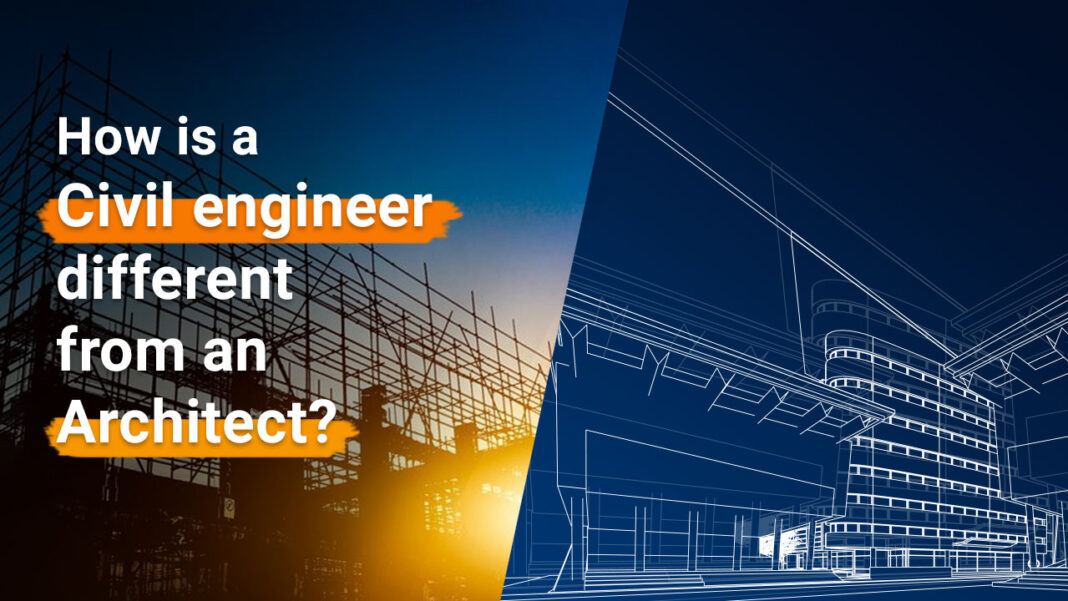Have a knack for creating and designing structures? There is a famous phrase “Rome was not built in a day”, similarly, making buildings and many commercial structures is not an easy task. If you are passionate enough, you will enjoy the process.
If you want to make a career in designing and creating structures, architecture and civil engineering are the best options for you. Both these fields are similar and different at the same time. Let’s see what these terms mean.
What Is Civil Engineering?
Civil Engineering is a branch of engineering. It mainly deals with designing, constructing, and maintaining physical structures to serve the public. These structures include highways, bridges, dams, sewage systems, roads, railways, airports, pipelines, and more.
It mainly works toward serving the general public and maintaining the constructed and natural structures.
What Does Civil Engineering Require?
- Critical Thinking
Civil engineering requires quick thinking and the best solutions that can work even with the limitations that many structures or tools hold. One may come across limited construction material, the state of the structure, and public safety as a hindrance. Herein, coming up with a feasible plan with limited resources is a must in this field.
- Designing And Execution
Civil engineering comprises designing, executing, and maintaining physical structures. A civil engineer also designs systems like sewage systems, pipelines, transportation, and more. One must be able to design and do proper execution of the plan to achieve the best result.
- Communication Skills
Many a time, civil engineers need to deal with clients to understand their needs and explain the plan to them. This requires great communication skills so that the client is able to understand.
- Managing Projects
Apart from designing and constructing structures, a civil engineer must also manage the project. This includes material listing, logistics tracking, and scheduling. They also need to consider building standards and regulations and come up with quick solutions if any site challenges arise.
- Technical Knowledge And Skills
A civil engineer must have an excellent understanding of mathematics and physics. They should also specialize in using design software. They should have worked on CAD (computer-aided design) suits and building design software.
Career In Civil Engineering
Civil engineering is a branch of engineering. Similarly, there are many sub-branches of civil engineering too. These are as follows:
- Geotechnical Engineering
- Transport Engineering
- Construction and Management Engineering
- Water Engineering
- Environmental Engineering
- Highway Engineering
- Earthquake Engineering
- Coastal Engineering
- Civil Engineering with Architecture
- Forensic Engineering
Civil engineers play a very important role in designing and managing traffic and transportation systems. They are also responsible for the smooth functioning of water and wastewater systems.
To pursue a career in civil engineering, you must possess a degree in the same. If you reside in Maharashtra, you can opt for good engineering colleges in Osmanabad. You can complete a B.Tech in civil engineering at an affordable fee.
Many B.Tech colleges in Maharashtra offer good faculty and a platform to pursue your career in civil engineering.
What Is Architecture?
Architecture is the art of designing and constructing structures. It can be termed as the process and product planning, designing, and constructing structures. It works on both the beauty and structure of a building.
What Does Architecture Require?
- Good Mathematics
It is important for an architect to know advanced mathematics because they need to calculate the aesthetic details of a building’s design. An architect also needs the same to calculate the weight-bearing strength and strain of the building.
- Knowledge Of Computer Software
It is important for an architect to know computer software like CAD (Computer-Aided Design) suites and BIM (Building Information Modeling) to design and construct buildings.
- Communication Skills
Architects have to deal with their clients, understand their needs, and explain the plan and design to them. This needs great communication skills to deliver clear messages.
- Independent Standing
Architects not only do jobs, but they also take up independent projects and freelance. They can easily establish their architecture company or pick freelance projects and increase their credibility.
- Designing Skills
Architecture is the art of designing and constructing buildings. Therefore, designing becomes the core skill any architect should possess. Designing skills are usually developed either with hand-drawing or computer designing software.
- Knowledge Of Building Codes
To be successful in their career, architects need to learn and recall the building codes of their region.
Career In Architecture
Just like civil engineering, architecture has different branches, them being:
- Landscape Architecture
- Residential Architecture
- Urban Designing
- Sustainable Architecture
- Conservation Architecture
- Industrial Architecture
- Interior Architecture
- Commercial Architecture
To pursue a career in architecture, it is a must to possess designing skills. Another important thing is to have a degree in architecture. You can pursue your career in any of the above branches of architecture.
Difference Between Civil Engineering And Architecture
Both civil engineering and architecture might look similar, but their working is different. There lies a thin line between the two fields. When it comes to civil engineering, it focuses more on constructing or enhancing structures to make them strong enough to withstand extreme weather conditions, checking the material quality used in making building physical structures, and more. On the other hand, architecture focuses more on enhancing the building with its aesthetics. Architecture comprises more artistry than civil engineering.
In the construction of a building, an architect is responsible for designing the building. They are responsible for deciding on details like shape, color, style, and more. After the architect is done with their work, the civil engineer assesses the building and ensures that it is strong enough. They look out for the best material to make the building.
Conclusion
Proper planning and structuring of buildings, roads, sewage systems, green belts, etc. make a place beautiful and civilized. Here’s where civil engineering and architecture come into play. While both the fields look the same, there is a thin line that separates them.
While architects focus on designing and styling buildings, civil engineers ensure that the building is strong enough to withstand extreme weather conditions. You can have a great career in both fields. However, it is important to know the difference between the two.
If you reside in Maharashtra, you can get good B.Tech colleges in Osmanabad. Getting a B.Tech degree from a good college is the first step toward becoming a civil engineer. Similarly, one needs to get a degree in architecture to pursue a career in architecture. Go ahead and enroll in the course that suits your needs the most and pursue your career in the field.















